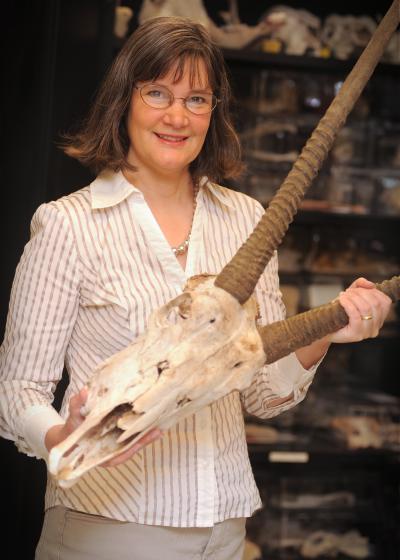NMSU researcher to explore the collapse and resilience of ancient civilizations

Though these events occurred more than a millennium ago, collapse and reorganization of societies are among the most critical issues of the new century, according to Rani Alexander, professor of anthropology at New Mexico State University.
In her 18 years as an NMSU researcher and professor - and a lifetime as an archaeologist - Alexander's expertise in the field of Maya archaeology and ethnohistory has lead her to explore not only the collapse but also the resilience of the Maya speaking descendant communities of the Yucatan peninsula.
"The popular press often claims that the ancient Maya mysteriously disappeared, but we know such statements are inaccurate," said Alexander. "Today, there are around a million Maya speakers living on the Yucatan peninsula - one of the largest descendant indigenous communities in the Americas - who survived the sixteenth century Spanish invasion, the ravages of the colonial period and the violence and repression that gave birth to modern Mexico."
In April, her proposal of a class titled The Archaeology of Sustainability: Exploring Human Social and Ecological Collapse, earned Alexander the 2014-2015 M. Eugene Sundt Honors Professorship. This endowment, through the Honors College, was established by a former NMSU student and generates $20,000 every two years.
"Since we're the Honors College, we wanted a professorship that would benefit students," said William Eamon, dean of NMSU's Honors College. "The idea was to have faculty nominate themselves and propose a special class that they would offer to teach for that semester, and maybe that class would become part of the honors curriculum."
This type of class is unique in that it allows the expertise of a working research faculty member, whose specialty is the subject of the class itself, to educate the students. The position is awarded to an NMSU professor who promotes innovative teaching ideas and fosters unique, experience-based classes.
"Sometimes it is the case that our faculty has research specializations that are a little difficult for students to grasp. But what we want to do with this is sort of challenge faculty to bring their research expertise to students in a way that they can understand it," Eamon said. "We, as academics, have an obligation to bring our knowledge to the public. And part of our public is the students we teach."
A feature of the class, otherwise known as the Sundt Seminar, is the inclusion of a field trip, funded in part by the endowment. For Alexander, this means spring break in Yucatan with 12-15 specially selected and honors qualified NMSU students, or Sundt Scholars.
"Since I started in NMSU's Anthropology Department, I've taught Ancient Mexico just about every fall semester. And during that course, we use such a wide range of visuals, my students get excited, and the next question is always 'why can't we go?'" Alexander said. "Teaching archaeology is so much more effective if you're actually there."
Additionally, over the past several years, there's been a broad movement in anthropology and archaeology to examine what makes a society sustainable and resilient. The civilizations of Yucatan are a prime example that is intensely debated.
"Because sustainability and resilience of past civilizations is hotly disputed in the interdisciplinary scientific arena, we have an opportunity to bring archaeology to a much wider audience than academic scholars," Alexander said. "Especially for students who are interested in sustainability; whether they are in engineering, environmental science, or social science and humanities. The comparison of collapsed civilizations becomes highly relevant to understanding what humans are doing to their environment today."
By exploring phenomenon described in "Collapse: How Societies Choose to Fail or Succeed," a 2005 book by American scientist and author Jared Diamond, Alexander's seminar will focus on two critical questions: how are the urgent environmental issues in the news today similar to those faced by past human societies, and how can human intervention avert collapse and promote sustainability?
Collapse and resilience have always been complementary parts of explanations about why civilizations fail. But today, it has acquired greater urgency in light of new questions about how humans will adapt to climate change, according to Alexander.
"Students are more interested in these questions now than they were twenty years ago," she said. "They're reading the debates about food systems, land degradation, environmental disasters and global warming and asking, 'what can we do about it?'"
"This is going to be a seminar that brings our students a kind of historical and archaeological understanding that might be applicable to present day concerns," said Eamon. "I think it's going to be, for the students selected, a really critical and important learning experience."
Alexander is the second recipient of the Sundt Honors Professorship. Connie Falk, an NMSU professor of agricultural economics, was the original 2011 beneficiary who took her scholars to Nicaragua to study sustainable development issues.
Sundt Honors Professors receive a salary increment of $10,000 plus a budget of approximately $10,000 to plan and finance the seminar, held in the spring semester of the awarded year. The Sundt Honors Professorship is a rotating chair that is held for two years, with the next Sundt Professor to be selected in 2015.
"Gene" Sundt was the grandson of the founder of M.M. Sundt Construction Company, which began in New Mexico in 1890 before relocating to Arizona. One of the firm's best-known projects in New Mexico was to build the town of Los Alamos in preparation for the Manhattan Project. In just 14 months, the company built homes, research buildings and the infrastructure to support a community of military and technical personnel. Gene Sundt, himself, directed the project. He attended NMSU in the 1930s, but left to join his family's company before receiving a degree.


